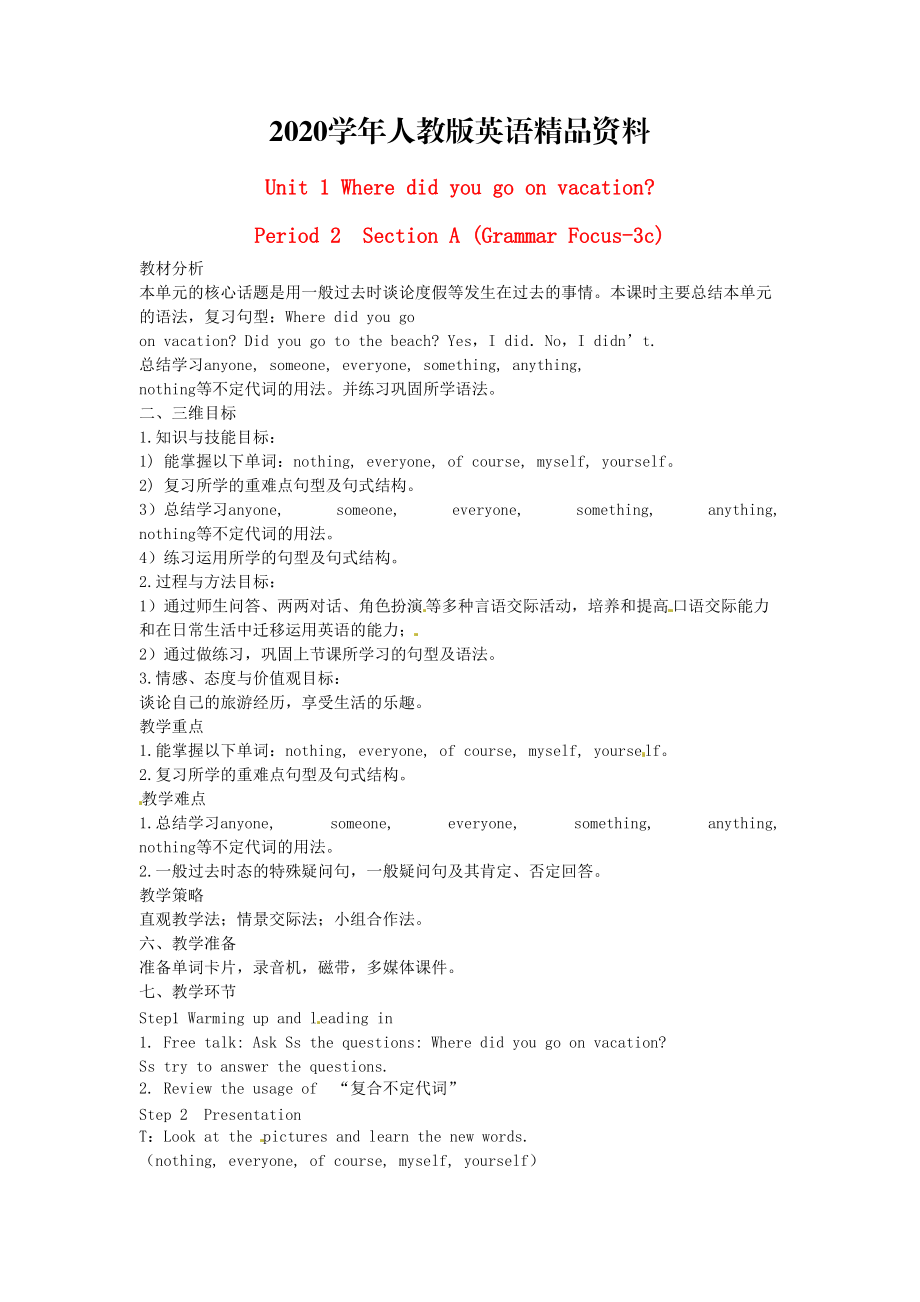《2020八年級英語上冊 Unit 1 Section AGrammar focus3c教案》由會員分享����,可在線閱讀,更多相關(guān)《2020八年級英語上冊 Unit 1 Section AGrammar focus3c教案(3頁珍藏版)》請?jiān)谘b配圖網(wǎng)上搜索����。
1、2020學(xué)年人教版英語精品資料
Unit 1 Where did you go on vacation?
Period 2 Section A (Grammar Focus-3c)
教材分析
本單元的核心話題是用一般過去時(shí)談?wù)摱燃俚劝l(fā)生在過去的事情����。本課時(shí)主要總結(jié)本單元的語法,復(fù)習(xí)句型:Wheredidyou go onvacation?Didyougotothebeach?Yes����,Idid.No����,Ididn’t. 總結(jié)學(xué)習(xí)anyone, someone, everyone, something, anything, nothing等不定代詞的用法����。并練習(xí)鞏固所學(xué)語法。
二����、三維目
2、標(biāo)
1.知識與技能目標(biāo):
1) 能掌握以下單詞:nothing, everyone, of course, myself, yourself����。
2) 復(fù)習(xí)所學(xué)的重難點(diǎn)句型及句式結(jié)構(gòu)。
3)總結(jié)學(xué)習(xí)anyone, someone, everyone, something, anything, nothing等不定代詞的用法����。
4)練習(xí)運(yùn)用所學(xué)的句型及句式結(jié)構(gòu)。
2.過程與方法目標(biāo):
1)通過師生問答����、兩兩對話、角色扮演等多種言語交際活動(dòng)����,培養(yǎng)和提高口語交際能力和在日常生活中遷移運(yùn)用英語的能力����;
2)通過做練習(xí)����,鞏固上節(jié)課所學(xué)習(xí)的句型及語法。
3.情感����、態(tài)度與價(jià)值觀目標(biāo):
談
3、論自己的旅游經(jīng)歷����,享受生活的樂趣����。
教學(xué)重點(diǎn)
1.能掌握以下單詞:nothing, everyone, of course, myself, yourself。
2.復(fù)習(xí)所學(xué)的重難點(diǎn)句型及句式結(jié)構(gòu)����。
教學(xué)難點(diǎn)
1.總結(jié)學(xué)習(xí)anyone, someone, everyone, something, anything, nothing等不定代詞的用法。
2.一般過去時(shí)態(tài)的特殊疑問句����,一般疑問句及其肯定����、否定回答����。
教學(xué)策略
直觀教學(xué)法;情景交際法����;小組合作法。
六����、教學(xué)準(zhǔn)備
準(zhǔn)備單詞卡片,錄音機(jī)����,磁帶,多媒體課件����。
七、教學(xué)環(huán)節(jié)
Step1 Warming up and
4����、 leading in
1. Free talk: Ask Ss the questions: Where did you go on vacation?
Ss try to answer the questions.
2. Review the usage of “復(fù)合不定代詞”
Step 2 Presentation
T:Look at the pictures and learn the new words.
(nothing, everyone, of course, myself, yourself)
Step 3 Grammar focus.
1. 學(xué)生
5����、閱讀Grammar Focus中的句子����,然后做填空練習(xí)。
1)你去了什么地方去度假����?
______ ______ you go on ___________?
2)我去了紐約市。
I _______ _______ New York City.
3)你和什么人別一起去的嗎����?
______ ______ go out with ________?
4)不����,沒有別人在這兒����。每個(gè)人都在度假。
No. ____ ______ was here.
________ was on _________.
… (其余試題見課件部分)
6����、2. 學(xué)生們完成填空試題后����,可以打開課本檢查答案����,對錯(cuò)誤的句子,單獨(dú)進(jìn)行強(qiáng)化記憶����。
3.Try to Find
一、復(fù)合不定代詞總結(jié):
1. some, any, no, every與-one, -thing可以組成八個(gè)不定代詞����,他們分別是:
someone, ________ _______ ________ __________ __________ ______________。
2. 帶some的復(fù)合不定代詞常用于肯定句中����;帶 any的復(fù)合不定代詞常用于否定句或一般疑問句中。例如:
我想吃點(diǎn)東西����。 I’d like _____________ to eat.
7、
今天有人給我打電話嗎����?
Did ________ call me today?
3. 當(dāng)形容詞修飾不定代詞時(shí)����,應(yīng)放在其后面����。例如:這本書里有什么新東西嗎?
Is there __________ _______ in this book?
今天沒有什么特別的事����。
There’s ___________ ________ today.
答案:1.something,anyone����,anything,no one����,nothing,everyone����,everything
2.something����,anyone
3.anythin
8����、g new����,nothing special
4. 由some, any, no, every構(gòu)成的復(fù)合不定代詞作主語時(shí),都作單數(shù)看待����,其謂語動(dòng)詞用單數(shù)第三人稱形式。例如:
Something is wrong with my watch.
Well, everyone wants to win.
Nobody knows what the future will be like.
There is something for everyone at Greenwood Park.
5. 除no one以外����,其他
9、復(fù)合不定代詞都寫成一個(gè)詞����。
二、學(xué)生們讀上面的探究試題����,并合作探究完成。
三����、看大屏幕����,校對答案����。
Step 4 Practice
Work on 3a:
1. Let Ss look at the conversation in 3a. First let one student read the words in the box.
2. Tell Ss to read the conversation and fill in the blanks.
3. 方法指導(dǎo):
首先,應(yīng)通讀對話����,掌握短文大意;其次����,回顧一下剛才學(xué)習(xí)的有關(guān)復(fù)合不定代詞的用法。
然后����,仔細(xì)閱讀
10、每個(gè)句子����,根據(jù)空格前后的詞語進(jìn)行推敲。比如����,第一句話是一個(gè)一般疑問句,空格前有do一詞����,可知空格處應(yīng)填anything一詞,意為“做什么事情”����。其他類似。
學(xué)生們����,按老師指導(dǎo)的方法進(jìn)行閱讀,并逐句推敲每空應(yīng)填什么詞����,在實(shí)際的運(yùn)用提高自己的閱讀能力、分析能力及綜合運(yùn)用能力����。
最后,教師與同學(xué)們一起校對答案����,并對學(xué)生們有疑問的地方進(jìn)行解釋����。
Explanation : 反身代詞
Work on 3b:
Tell Ss to fill in the blanks in the e-mail message with the words in the box.
2. Chec
11����、k the answers.
Step 5 Group work
1. Work on 3c: Ask your group questions about their vacation. Then tell the class your results.
2. Fill in the blanks according to the answers.
3. Try to make a report in each group. Then let one student read the report to the class.
(最后,可以經(jīng)學(xué)生們評議來推舉最有能力的小組)
12����、Step 6 Summary
What have you learned in this lesson?(讓學(xué)生自己總結(jié)這節(jié)課中學(xué)到了什么。)
Step 7 Homework
1. 背誦Grammar focus 部分����。
2. 復(fù)習(xí)復(fù)合不定代詞及反身代詞的用法。
八����、板書設(shè)計(jì):
Unit 1 Where did you go on vacation?
Section A Grammar focus-3c
anyone, someone, everyone, something, anything, nothing
Did you go out with anyone?
No. No one was here. Everyone was on vacation.
Did you buy anything special?
Yes, I bought something for my father.
No, I bought nothing.
How was the food? Everything tastes good.
 2020八年級英語上冊 Unit 1 Section AGrammar focus3c教案
2020八年級英語上冊 Unit 1 Section AGrammar focus3c教案

